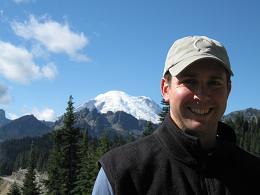hood of blank sky a white man dragged
behind a ford wrists tied to a strong rope
in the truck cab two men drink rainier
beer the wailings of jimi hendrix drown
out the screams of the dying man
they bury him above a riverbank two
deer watch silently chewing leaves with
blank glassy eyes skeletal white bodies
of streamside cottonwoods standing in
careless witness as the final shovel-
fuls of wet earth are tossed on the pale
limp body
there is a moment, at
the end, where he
thinks of god, the
way he thinks of
the sky: distant,
and sometimes it
rains, and sometimes
it doesn’t and some-
times two men drag
a third behind a rusted
ford toward the river
where they bury him
deep in the muddy
soil
thinks about the way she would plant
tulip bulbs in the damp earth in front
of their mobile home yard
full of fishing net and styrofoam buoys
piles of cedar firewood sleeping underneath
mossy blue tarps he remembers the
softness of her hands she’d been
broken somehow years earlier and now
everything about
her was soft and gentle—you even drive
slow, he remembers kidding her, just
above a whisper
he (this is the third
man) notices that the
sky has opened up today; that
the clouds have, thank god,
thinned, letting pale
sunlight leak through; that
dark green trees flash by
he thinks of his son’s
gaunt face and loud motor-
cycle, and the way he would
watch television, at night, as
if willing the noise to drown
out the sometimes
overwhelming pain
trees river rope sky
dust truck wheels fir
trees flashing by in
silent accomplice
streamside cottonwoods
sullen wise ford
screeching on thinning
tires on the road above
the flashing river
glimpsed
through thin trees
bears
the awful weight of
the sun
tell me the story of two
men who dragged a third
behind their truck to the
elwha and buried that
third in the dull wet earth
above the rock-studded
water water crashing against
the rocks the dull cry of shovel
blade into soft earth the thud
of earth and scrape of shovel
and the scream of the man
still playing in their ears
like on a scratched record
a hundred years later as
they drink beer
sitting on the front
or back steps of their homes not talking about that
day where they’d met the man in the diner and
the way he’d looked at them and then, finding out
what his last name was, visiting on him the sins of
his fathers and grandfathers, not talking about that
day where the light had been gray and soft leaking
down from what some men refer to as heaven and
others the sky, not talking about the screech of the
tires as he, the driver, ground
to a halt above the elwha and untied lifeless
hands from a rope he never remembered what
happened to that rope had he put it in the truck
bed or thrown it in the river or tossed it into the
overwhelming ache of the hole
with the dead man he didn’t remember nor did
he ever talk about it not even with the other man
or the streams of wives and girlfriends who
passed through his life instead he
barbecued and played softball and it were
as if the thing had never
happened which almost made it not worth it
almost and so he played it in his mind like
a slow motion replay over and over as he got
older until the thing had been played so often that
it had lost its sound and he forgot the screams
and the way the water had flashed past the rocks
and the dull scrape of the shovel and the heavy
groan of the body and all he remembered was the
sky, coolly distant, and the way empty gray
light had fallen like dimes around his shoulders
 Jordan Hartt is the director of programs for the Port Townsend Writers’ Conference. He is also the project director for the Conversations Across Borders Project, which pairs writers across borders to create new work. Previous creative work has appeared in such magazines as Another Chicago Magazine (ACM), Black Zinnias, the Crab Creek Review, and Prose Poem.
Jordan Hartt is the director of programs for the Port Townsend Writers’ Conference. He is also the project director for the Conversations Across Borders Project, which pairs writers across borders to create new work. Previous creative work has appeared in such magazines as Another Chicago Magazine (ACM), Black Zinnias, the Crab Creek Review, and Prose Poem.
